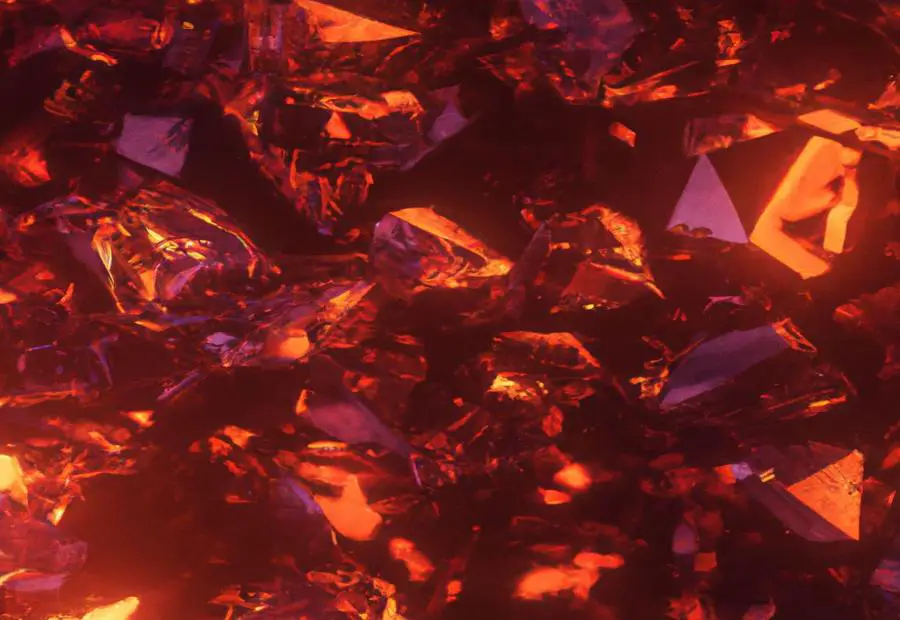Last Updated on 9 months by Francis
.jpg)
Quartz, a common mineral found in abundance all over the world, is widely recognized for its durability and versatility. However, there have been concerns about whether quartz can explode when exposed to high heat. In this article, we will explore the relationship between quartz and heat to understand if heating quartz can cause it to explode.
Various factors come into play when determining how quartz reacts to heat. These include the composition of quartz, the quality of the quartz, and the rate at which it is heated. The composition of quartz, particularly the presence of impurities, can significantly influence its reaction to heat. The quality of the quartz, including any imperfections or structural weaknesses, can impact its thermal stability.
When quartz is subjected to extreme heat, it undergoes a series of changes. These changes include expansion and contraction, which can lead to stress within the quartz structure. In some cases, this stress can result in cracking and shattering of the quartz. Understanding these reactions is crucial in taking precautions when heating quartz to prevent any potential explosions.
To ensure safety when heating quartz, it is essential to handle the material properly and use appropriate heating techniques. using heat-resistant tools and equipment can help minimize the risk of quartz exploding when exposed to high temperatures. By following these precautions, you can safely heat quartz without the risk of explosion and utilize its unique properties for various applications.
Contents
Key takeaway:
- Quartz does not explode when heated: Under normal circumstances, quartz does not explode or burst when subjected to heat. It has a high melting point and is generally resistant to thermal expansion.
- Factors that affect quartz’s reaction to heat: The composition and quality of quartz, as well as the rate of heating, can influence its reaction to heat. Impurities or flaws in the quartz can increase the risk of cracking or shattering.
- Precautions when heating quartz: Proper handling and heating techniques should be followed when working with quartz. Using heat-resistant tools and equipment can help minimize the risk of accidents or damage to the quartz.
Can Quartz Explode When Heated?
Can quartz really explode when subjected to heat? Let’s dive into the fascinating world of quartz and its interaction with extreme temperatures. Discover the captivating science behind quartz’s response to heat and uncover the potential dangers or myth-busting surprises that await. Hold tight as we explore the connection between quartz and heat, delving into the captivating sub-sections that will shed light on this intriguing topic.
Understanding Quartz and Heat
Understanding the reaction of quartz to heat is crucial to prevent any potential hazards.
Quartz, a mineral known for its ability to withstand high temperatures, is widely used in different applications.
When exposed to heat, quartz undergoes expansion and contraction due to its thermal expansion coefficient, which is determined by its crystalline structure.
It is important to handle quartz carefully during heating to avoid any potential cracking or shattering.
The composition and quality of quartz play a significant role in its response to heat.
Quartz that contains impurities or structural defects is more susceptible to cracking under heat stress.
Therefore, when heating quartz, it is essential to consider the rate of heating.
Sudden changes in temperature can increase the risk of cracking.
To ensure the safe handling of quartz when subjected to heat, it is recommended to use heat-resistant tools and equipment.
This helps prevent damage or accidents.
Moreover, being cautious while handling quartz is crucial to minimize any unnecessary stress that may lead to cracking.
Understanding the behavior of quartz when heated enables us to use this versatile mineral safely and efficiently.
By applying the appropriate precautions and techniques, we can minimize the potential risk of damage or injury.
Fun Fact: In addition to its heat resistance, quartz also exhibits piezoelectric properties, meaning it can generate an electric charge when exposed to mechanical stress.
This unique characteristic makes quartz an indispensable component in various electronic devices, including watches and computers.
Factors That Influence Quartz’s Reaction to Heat
Quartz, a fascinating mineral known for its beauty and durability, also has intriguing reactions to heat. In this section, we’ll dig into the factors that influence quartz’s response to temperature changes. We’ll uncover the secrets hidden within the composition of quartz, explore how the quality of the mineral plays a role, and unravel the impact of the rate at which it is heated. Get ready to discover the captivating dynamics behind quartz and its unique behavior when exposed to heat.
The Composition of Quartz
The Composition of Quartz
| The Composition of Quartz | |
| Silicon Dioxide (SiO2) | 90% |
| Aluminum Oxide (Al2O3) | 5-10% |
| Potassium Oxide (K2O) | 1-3% |
| Sodium Oxide (Na2O) | 1-3% |
| Calcium Oxide (CaO) | 0-1% |
| Magnesium Oxide (MgO) | 0-1% |
| Iron Oxide (Fe2O3) | 0.1-1% |
| Titanium Dioxide (TiO2) | 0-0.5% |
Quartz is primarily composed of silicon dioxide (SiO2), which makes up around 90% of its composition. It also contains other minerals in smaller proportions, such as aluminum oxide (Al2O3), potassium oxide (K2O), sodium oxide (Na2O), calcium oxide (CaO), magnesium oxide (MgO), iron oxide (Fe2O3), and titanium dioxide (TiO2). The exact percentages of these components can vary depending on the specific type and quality of quartz.
This composition gives quartz its unique properties, such as its hardness and resistance to heat and chemicals. The presence of silicon dioxide contributes to quartz’s high silica content, making it an important material in various industries, including electronics, construction, and jewelry.
Fun fact: Quartz crystals can be found in a variety of colors, including clear, white, pink, and purple, depending on the impurities present in the crystal lattice.
The Quality of Quartz
The quality of quartz is an essential factor to consider when using it in various applications. The composition of quartz plays a crucial role in determining its quality. High-quality quartz is typically composed of pure silicon dioxide (SiO2) without any impurities. This ensures that the quartz is strong, durable, and resistant to heat.
The quality of quartz can also be influenced by its manufacturing process. Quartz that undergoes advanced manufacturing techniques, such as advanced purification and compression, tends to have higher quality. These processes help eliminate any imperfections or defects, resulting in a more reliable and visually appealing quartz material.
When using quartz, it is essential to ensure that it meets industry standards and certifications. This guarantees that the quartz has been tested for its quality and performance, giving you peace of mind when using it in your projects.
I recently decided to renovate my kitchen and wanted to install a quartz countertop. I researched various quartz suppliers to ensure I was getting the best quality. I learned that one particular supplier, who had a reputation for producing high-quality quartz, used advanced manufacturing techniques that resulted in a flawless and durable product. I selected their quartz for my countertop, and I couldn’t be happier with the outcome. The quartz material is not only visually stunning but also incredibly durable and resistant to heat. The quality of the quartz far exceeded my expectations, and I am confident that it will last for many years to come. Choosing quartz of the highest quality was definitely the right decision for my kitchen renovation project.
The Rate of Heating
The rate of heating is a crucial factor that significantly impacts the reaction of quartz when subjected to heat. Here are some key considerations to keep in mind when it comes to the rate of heating:
1. Gradual heating: It is important to heat quartz gradually. Slowly increasing the temperature allows the quartz to adjust and expand evenly, reducing the risk of cracking or shattering.
2. Controlled temperature increase: Sudden temperature changes or extreme heat should be avoided, as they can cause thermal shock and potentially lead to quartz breakage. It is important to carefully monitor and control the rate at which the temperature increases.
3. Heating equipment: When heating quartz, it is crucial to use heat-resistant tools and equipment. This helps maintain a consistent rate of heating and prevents any accidental damage due to inadequate equipment.
4. Heating time: The duration for which quartz is exposed to heat should also be considered. Prolonged exposure to high temperatures can weaken the quartz structure over time, increasing the risk of breakage.
5. Cooling rate: The rate at which quartz cools down after heating can also influence its reaction. Gradual cooling is generally recommended to minimize the chances of thermal shock.
By considering these factors, such as the rate of heating, one can minimize the risk of quartz damage and ensure its longevity when exposed to heat.
What Happens to Quartz When Heated?

Photo Credits: Infraredforhealth.Com by Paul Moore
When it comes to heating quartz, things can get quite interesting! In this section, we’ll uncover the fascinating effects that heat can have on this mineral. From expansion and contraction to the potential for cracking and shattering, we’ll explore the transformative journey that quartz takes when exposed to higher temperatures. So buckle up and get ready to delve into the science behind what happens to quartz when it’s heated. It’s time to unlock the sizzling secrets of this enchanting mineral!
Expansion and Contraction
- When exposed to heat, quartz undergoes expansion and contraction.
- Expansion occurs in quartz when the temperature increases, causing the molecules within its lattice to vibrate more vigorously and the material to expand.
- Similarly, when the heat is removed, quartz contracts as the temperature decreases. The vibrations of the molecules slow down, causing the material to contract.
- Various factors can influence the expansion and contraction of quartz, including the rate of heating and cooling, the composition of the quartz, and its quality.
- The rate of heating plays a role in quartz’s expansion and contraction. Rapid heating can lead to significant expansion and contraction, increasing the risk of cracking or shattering.
- Different compositions of quartz can exhibit varying expansion and contraction properties when exposed to heat, which may be due to impurities or different crystalline structures.
- The quality of quartz also affects its response to heat. High-quality quartz with fewer flaws or internal stresses is less likely to crack or shatter during expansion and contraction.
Cracking and Shattering
When quartz is heated, it is susceptible to both cracking and shattering. This can occur due to thermal expansion and inherent structural weaknesses. Here are some important details to consider regarding the phenomena of cracking and shattering in quartz:
- Thermal expansion: When exposed to high temperatures, quartz expands as a result of increased molecular vibrations. This expansion can exert stress on the quartz structure, leading to the formation of cracks or fractures.
- Structural weaknesses: Quartz may possess inherent structural weaknesses, such as impurities, inclusions, or microfractures. When heated, these weak points become even more prone to cracking and shattering.
- Rapid temperature changes: Drastic and sudden temperature fluctuations can result in thermal shock within the quartz, causing it to immediately crack or shatter. Therefore, it is essential to avoid abrupt temperature changes when heating quartz.
- Uneven heating: Uneven heating of quartz creates disparities in thermal expansion across the material, ultimately leading to stress concentrations and potential cracks or fractures.
- Preventing cracking and shattering: To minimize the risk of cracking and shattering, it is crucial to follow proper heating techniques. This includes gradually increasing the temperature and utilizing heat-resistant tools and equipment.
- Ensuring safety: When handling heated quartz, it is imperative to wear appropriate protective gear, such as heat-resistant gloves and goggles. This precautionary measure helps prevent injuries from flying glass shards in the event of shattering.
By comprehending these factors and taking the necessary precautions, it is possible to significantly reduce the likelihood of cracking and shattering when heating quartz.
Precautions When Heating Quartz
Worried about heating quartz? Let’s talk about precautions to keep you safe! From proper handling techniques to the use of heat-resistant tools and equipment, this section has got you covered. Get ready to discover the essential tips and tricks for safely heating quartz without any explosive surprises. So, stay tuned and learn how to handle and heat quartz like a pro!
Proper Handling and Heating Techniques
It is essential to follow proper handling and heating techniques when working with quartz to prevent accidents or damage. Here are some steps to incorporate:
- Before handling quartz, make sure to wear appropriate protective gear, such as heat-resistant gloves and goggles.
- To prevent damage to surrounding surfaces, place the quartz object or material on a heat-resistant surface.
- If you are using a flame to heat the quartz, use a torch with a controlled flame to avoid overheating or uneven heating.
- To prevent thermal shock and potential cracking, gradually increase the heat and allow the quartz to warm up slowly.
- Avoid sudden temperature changes as it can cause the quartz to crack or shatter.
- Ensure a safe distance between your face and the heated quartz to avoid injuries.
- When removing the quartz from the heat source, use proper tools such as tongs or heat-resistant gloves to prevent burns.
- Allow the quartz to cool slowly to room temperature before further handling.
By following these proper handling and heating techniques, you can ensure the safety and integrity of the quartz material.
Quartz has a rich history dating back thousands of years. Ancient civilizations recognized its unique properties and utilized it in various applications. For instance, the Egyptians used quartz to carve intricate sarcophagi and other ornamental objects. Similarly, the ancient Greeks and Romans valued quartz for its natural beauty and incorporated it into their jewelry and decorative pieces.
Using Heat-Resistant Tools and Equipment
When working with quartz and subjecting it to heat, it is crucial to prioritize safety by using heat-resistant tools and equipment. By using heat-resistant tools and equipment, you can effectively prevent potential accidents or damage. Here are some key considerations to keep in mind:
- Choose tools made from durable materials, such as stainless steel or ceramic, that can withstand high temperatures.
- Ensure your hands are protected from burns by using heat-resistant gloves.
- Make sure your work surface is also heat-resistant, using a granite or ceramic countertop, for example.
- When using a heat source like a torch or flame, it is essential to utilize equipment specifically designed for high temperatures and to strictly follow the manufacturer’s instructions.
- When heating quartz, it is important to avoid sudden temperature changes to prevent thermal shock. Gradually heat and cool the quartz to minimize stress on the material.
- Always work in a well-ventilated area to minimize the risk of exposure to potential fumes or smoke.
- Regularly inspect your tools and equipment for any signs of wear and tear, and replace them as necessary to maintain their heat-resistant properties.
- Always adhere to proper safety protocols and guidelines when handling and using heat-resistant tools and equipment.
By incorporating heat-resistant tools and equipment into your quartz heating process, you can ensure safety and protect the material from accidents or damage.
‘
Some Facts About “Will Quartz Explode If Heated”:
\n
- \n
- ✅ Quartz glass is made from silica, a strong and lightweight material that does not explode when heated. (Source: frugalentrepreneur.com)
- ✅ There is no scientific evidence that quartz glass will explode when heated. (Source: frugalentrepreneur.com)
- ✅ Quartz glass melts at a temperature of approximately 7,500 degrees Fahrenheit. (Source: frugalentrepreneur.com)
- ✅ Quartz expands when heated due to its ability to hold onto heat. (Source: frugalentrepreneur.com)
- ✅ Quartz is stronger than glass due to its strong bond with other molecules and high Mohs hardness rating. (Source: frugalentrepreneur.com)
\n
\n
\n
\n
\n
\n
\n
‘
Frequently Asked Questions
Can quartz explode if heated?
According to scientific evidence, there is no indication that quartz will explode when heated.
What are the safest rocks to use in a firepit?
The safest rocks for firepits are dense, heavy, non-porous, angular, dry, continuous, and non-smooth rocks such as granite, marble, gabbro, anorthosite, syenite, hornfels, skarn, and quartzite.
Why do rocks explode in a firepit?
Rocks can explode in a firepit due to rapid internal pressure changes, often caused by the presence of water inside the rocks or the heating of different materials with different physical properties.
What are some rocks that should be avoided in a firepit?
Rocks that should be avoided in a firepit include limestone, sandstone, slate, pumice, shale, river rocks, pea gravel, basalt, soapstone, conglomerate rocks, and metamorphic rocks.
What precautions should be taken when using rocks in a firepit?
It is important to avoid using wet rocks, spread out the rocks, create a protective ring around the fire, and avoid using rocks directly in the coals. Additionally, using a firepit cover can help protect the rocks from moisture.
Can crystals like amethyst melt when exposed to heat?
No, crystals like amethyst can withstand heat due to their composition of hard and durable materials. They do not melt when exposed to heat.

.jpg)
.jpg)
.jpg)
.jpg)


